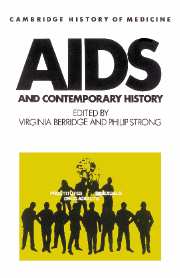Introduction: AIDS and contemporary history
Published online by Cambridge University Press: 14 October 2009
Summary
There is a different historical consciousness around AIDS at the end often years. AIDS now has its own history, rather than borrowing from the more distant past. Surveys of the recent past, looking back over a decade, are common. There is a realisation, too, that understanding AIDS requires an assessment of the ‘larger agenda’ of health, social and science policy development in the post-war period. The impact of the disease cannot be assessed without knowing something of this ‘pre-history’. This book is therefore framed around the twin areas of AIDS as history and the pre-history of the disease. Its concern is very much with AIDS as an issue in contemporary history and with the perspectives on the history of post-war health policy which it has revealed.
The purpose of this introductory chapter is not just to survey AIDS as a problem in contemporary history, but to reflect on the changing relationship of AIDS and history over the past ten years. For even in its early stages, the disease brought history in its train. The function of the discipline was different at that time. Much historical commentary aimed to point a ‘lesson of history’. Its concern was to draw parallels with the distant past rather than to locate AIDS in its immediate pre-history. The form of history has therefore changed over time. It has shifted from far distant events to those of only a few years ago. The function of history, too, has shifted.
- Type
- Chapter
- Information
- AIDS and Contemporary History , pp. 1 - 14Publisher: Cambridge University PressPrint publication year: 1993
- 1
- Cited by

